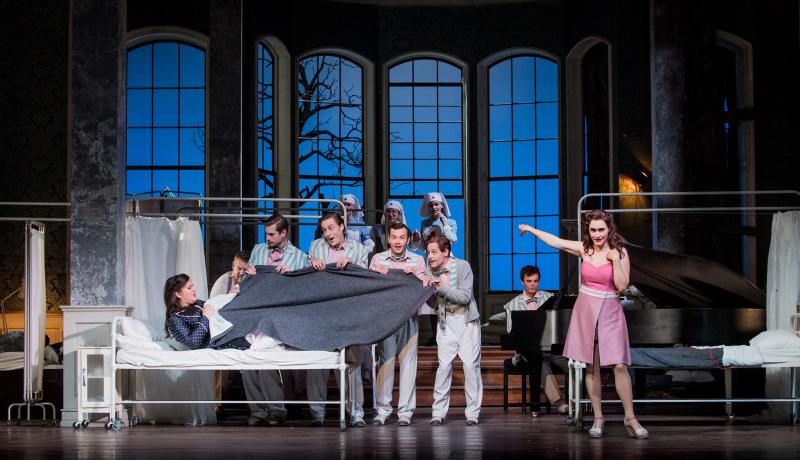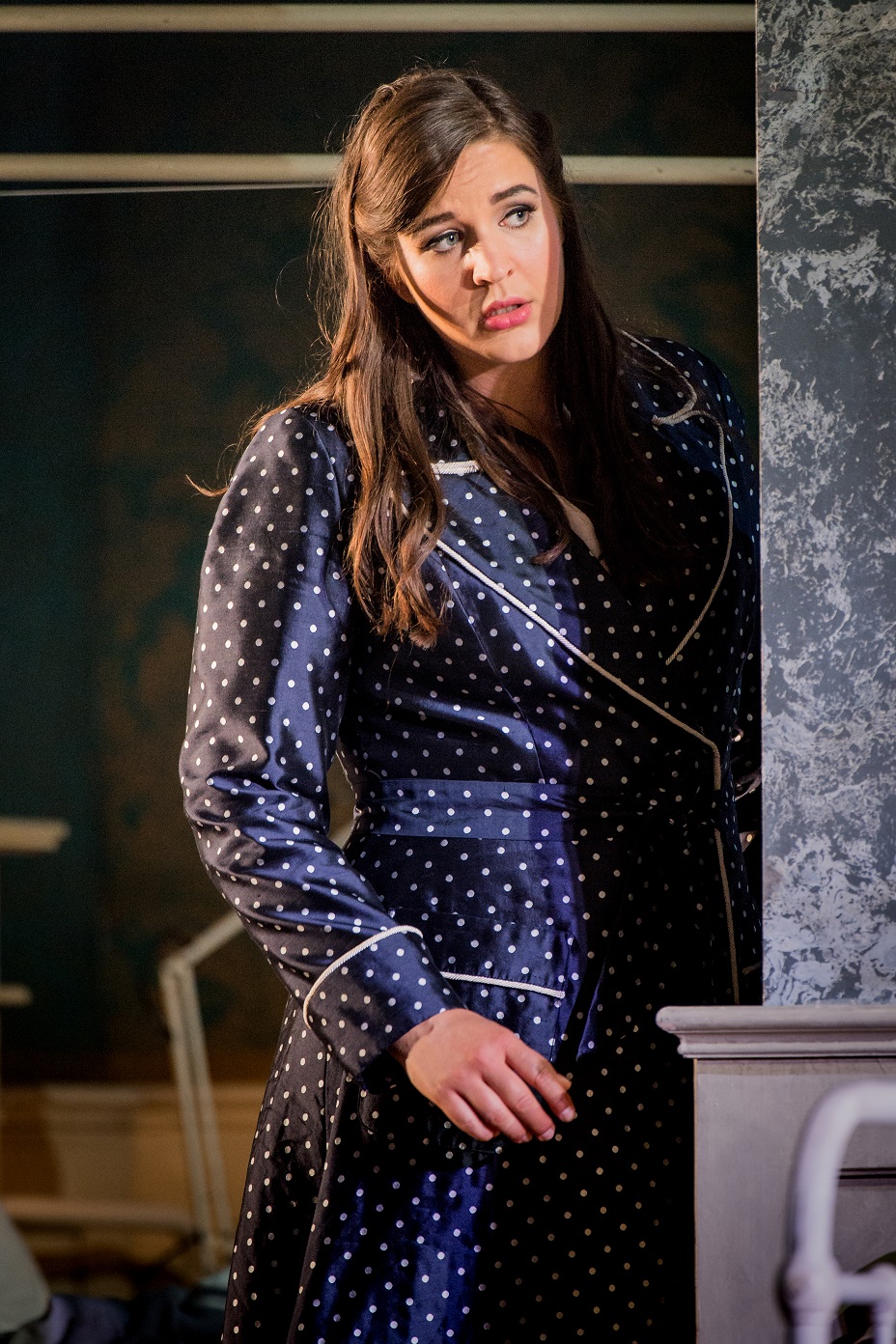Ariadne auf Naxos, Glyndebourne review – seriously compelling revival | reviews, news & interviews
Ariadne auf Naxos, Glyndebourne review – seriously compelling revival
Ariadne auf Naxos, Glyndebourne review – seriously compelling revival
Notable debuts bring fresh energy to Strauss's opera about opera

It’s often said that Ariadne auf Naxos is all about The Composer – not only Richard Strauss but an affectionate parody of his younger self – and Katharina Thoma takes this idea seriously in her Glyndebourne production.
Part spoken play, part tragedy, part commedia dell’arte, Ariadne is 100 percent meta-opera. From the outset, place and time are established so firmly – wartime Glyndebourne – that it takes a few minutes to get over the cast singing and speaking in German, as apparently it did when the production was first staged in 2013. If this indicates a strategy of disconcertion – and why not? – it sits uneasily with the homespun feel of the stagecraft in the Prologue. Sir George Christie would surely raise an eyebrow at the supernumeraries milling around a rather drab recreation of his front room. This part of the evening, at least, should be funny; perhaps the pacing will tighten and the payoff lines will zing during the run.
There are some very damaged people on stage when the curtain opens on the Opera proper to reveal the old house become a hospital. The patients make an unlikely jumble of shellshocked squaddies and depressed luvvies recovering from the cataclysm which brought the Prologue to end in flames. This is Glynditz, the (mostly) affectionate trade nickname for the old place, where leaving is more of a challenge than arriving. There is a point well made, of opera as a therapeutic space, not only for its audience but its actors. You don’t have to be mad to work here, the production seems to say, but it helps.
 Directing the revival of her own production, Thoma exploits the gifts and talents of four principals who are also new to Glyndebourne. Brower plays The Composer straight, less neurotic than many predecessors in the role, taking all the few opportunities available to her for warm and not only urgently lyrical flourishes. The stage is held by Lise Davidsen in the title role as a convincingly young woman, dumped and in despair: quite a contrast to the washed-up diva guyed so mercilessly by Christof Loy in his Royal Opera staging.
Directing the revival of her own production, Thoma exploits the gifts and talents of four principals who are also new to Glyndebourne. Brower plays The Composer straight, less neurotic than many predecessors in the role, taking all the few opportunities available to her for warm and not only urgently lyrical flourishes. The stage is held by Lise Davidsen in the title role as a convincingly young woman, dumped and in despair: quite a contrast to the washed-up diva guyed so mercilessly by Christof Loy in his Royal Opera staging.
Davidsen (pictured right) plays on her statuesque presence in the Prologue, but she fills the entire house in the Opera with a thrilling if sometimes steel-tipped soprano. Scarcely less impressive are the tenor AJ Glueckert, full of Heldentenor sap as her late-arriving redeemer, Bacchus; and Erin Morley, playing Zerbinetta not as a nemesis but the yang to Ariadne’s yin: it takes real courage to sing her set-piece as a mad scene out of Bellini, and not just for laughs. Supporting roles are well cast: as the Music Master, Sir Thomas Allen does what he can to whip the Prologue into shape, and Hyesang Park (Naiad), Avery Amereau (Dryad) and Ruzan Mantashyan (Echo) make a strong and beguiling trio of companions to Ariadne.
Also making his Glyndebourne debut, Cornelius Meister directs the London Philharmonic in an account of greater clarity than wit, rhythmically a little stiff in the Prologue and beset by a few glitches of coordination in the comic ensembles of the Opera. Once it’s run in, the show will be well worth seeing by anyone who doesn’t think they already know what this elusive piece is really "about" – and for Davidsen, who should not be short of future engagements.
Add comment
The future of Arts Journalism
You can stop theartsdesk.com closing!
We urgently need financing to survive. Our fundraising drive has thus far raised £49,000 but we need to reach £100,000 or we will be forced to close. Please contribute here: https://gofund.me/c3f6033d
And if you can forward this information to anyone who might assist, we’d be grateful.

Subscribe to theartsdesk.com
Thank you for continuing to read our work on theartsdesk.com. For unlimited access to every article in its entirety, including our archive of more than 15,000 pieces, we're asking for £5 per month or £40 per year. We feel it's a very good deal, and hope you do too.
To take a subscription now simply click here.
And if you're looking for that extra gift for a friend or family member, why not treat them to a theartsdesk.com gift subscription?
more Opera
 Carmen, English National Opera review - not quite dangerous
Hopes for Niamh O’Sullivan only partly fulfilled, though much good singing throughout
Carmen, English National Opera review - not quite dangerous
Hopes for Niamh O’Sullivan only partly fulfilled, though much good singing throughout
 Giustino, Linbury Theatre review - a stylish account of a slight opera
Gods, mortals and monsters do battle in Handel's charming drama
Giustino, Linbury Theatre review - a stylish account of a slight opera
Gods, mortals and monsters do battle in Handel's charming drama
 Susanna, Opera North review - hybrid staging of a Handel oratorio
Dance and signing complement outstanding singing in a story of virtue rewarded
Susanna, Opera North review - hybrid staging of a Handel oratorio
Dance and signing complement outstanding singing in a story of virtue rewarded
 Ariodante, Opéra Garnier, Paris review - a blast of Baroque beauty
A near-perfect night at the opera
Ariodante, Opéra Garnier, Paris review - a blast of Baroque beauty
A near-perfect night at the opera
 Cinderella/La Cenerentola, English National Opera review - the truth behind the tinsel
Appealing performances cut through hyperactive stagecraft
Cinderella/La Cenerentola, English National Opera review - the truth behind the tinsel
Appealing performances cut through hyperactive stagecraft
 Tosca, Royal Opera review - Ailyn Pérez steps in as the most vivid of divas
Jakub Hrůša’s multicoloured Puccini last night found a soprano to match
Tosca, Royal Opera review - Ailyn Pérez steps in as the most vivid of divas
Jakub Hrůša’s multicoloured Puccini last night found a soprano to match
 Tosca, Welsh National Opera review - a great company reduced to brilliance
The old warhorse made special by the basics
Tosca, Welsh National Opera review - a great company reduced to brilliance
The old warhorse made special by the basics
 BBC Proms: The Marriage of Figaro, Glyndebourne Festival review - merriment and menace
Strong Proms transfer for a robust and affecting show
BBC Proms: The Marriage of Figaro, Glyndebourne Festival review - merriment and menace
Strong Proms transfer for a robust and affecting show
 BBC Proms: Suor Angelica, LSO, Pappano review - earthly passion, heavenly grief
A Sister to remember blesses Puccini's convent tragedy
BBC Proms: Suor Angelica, LSO, Pappano review - earthly passion, heavenly grief
A Sister to remember blesses Puccini's convent tragedy
 Orpheus and Eurydice, Opera Queensland/SCO, Edinburgh International Festival 2025 review - dazzling, but distracting
Eye-popping acrobatics don’t always assist in Gluck’s quest for operatic truth
Orpheus and Eurydice, Opera Queensland/SCO, Edinburgh International Festival 2025 review - dazzling, but distracting
Eye-popping acrobatics don’t always assist in Gluck’s quest for operatic truth
 MARS, Irish National Opera review - silly space oddity with fun stretches
Cast, orchestra and production give Jennifer Walshe’s bold collage their all
MARS, Irish National Opera review - silly space oddity with fun stretches
Cast, orchestra and production give Jennifer Walshe’s bold collage their all
 Káťa Kabanová, Glyndebourne review - emotional concentration in a salle modulable
Janáček superbly done through or in spite of the symbolism
Káťa Kabanová, Glyndebourne review - emotional concentration in a salle modulable
Janáček superbly done through or in spite of the symbolism

Comments
I have read some sniffy